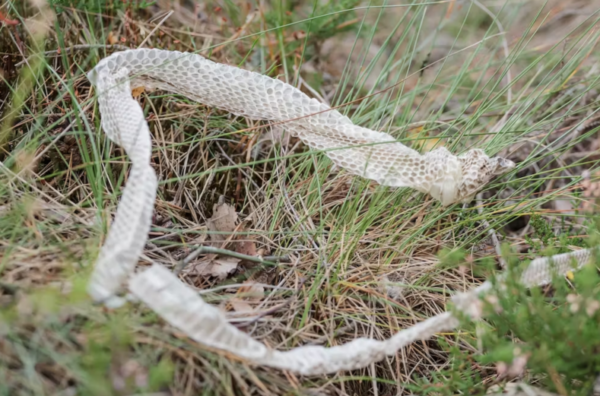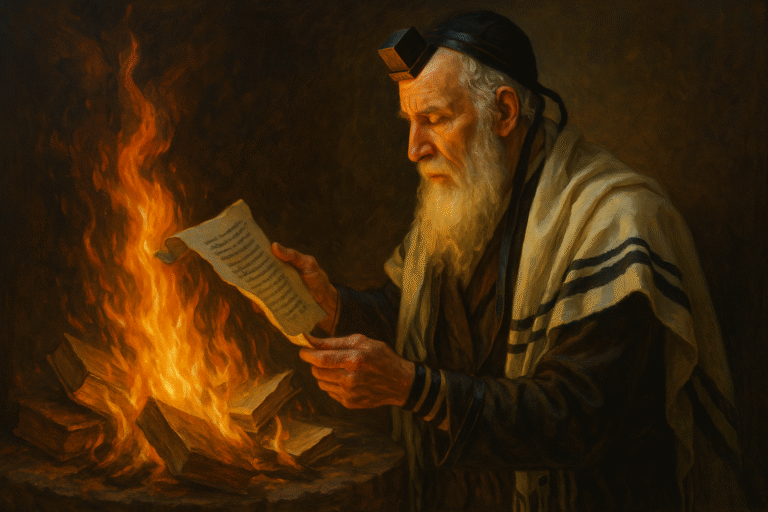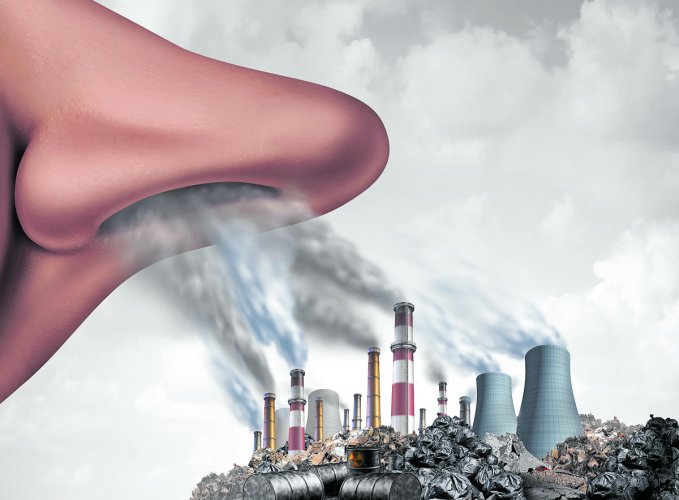The Skin of the Serpent

Why the Body Should be a Source of Shame
Tangentially to the main thrust of last week's article which focused on the necessity of modesty, we cited an interesting statement in the Kitzur Shulchan Aruch (3:1): וְהַצְּנִיעוּת וְהַבֹּשֶׁת מְבִיאוֹת אֶת הָאָדָם לִידֵי הַכְנָעָה לְפָנָיו יִתְבָּרַךְ שְׁמוֹ (Modesty [tzniut] and shame bring a person to know submissiveness before Him, blessed be His name). We also learned that true beauty relates to the soul, not to the body, and that there's absolutely nothing honorable or glorious about a physical body, as it says (Mishlei 31:30): שֶׁקֶר הַחֵן וְהֶבֶל הַיֹּפִי (Grace is falsehood and beauty is vanity).
The question we wish to address now concerns the reason behind these statements. What is it about the physical body that is so shameful? Didn't Hashem create us with a physical body, and if so, shouldn't it be a source of glory and honor, and not of shame? If we can answer these questions correctly, we should be able to more fully understand the importance of modesty in the first place, i.e. why, according to the Torah, one must cover the body and not, G-d forbid, expose it.
After Adam ha-Rishon and Chavah sinned, we read the following (Bereshit 3:21): וַיַּעַשׂ יְיָ אֱלֹקִים לְאָדָם וּלְאִשְׁתּוֹ כׇּתְנוֹת עוֹר וַיַּלְבִּשֵׁם (And Hashem G-d made garments of skin [kotnot or] for the man and his wife, and He clothed them). Is the meaning of this verse like what we might have learned in kindergarten, that G-d killed an animal, skinned it and put the leather on them to cover them so they wouldn't be standing around naked? Or is there something more to it than that?
The Arizal taught (see Eitz Chaim 49:4) that when Adam ha-Rishon was originally created, his soul was clothed in כׇּתְנוֹת אוֹר [kotnot or, garments of light] with an aleph, א. His body was so luminous, that even after his burial, the skin of his two heels shone like the sun (Baba Batra 58a): אָמַר רַבִּי בְּנָאָה נִסְתַּכַּלְתִּי בִּשְׁנֵי עֲקֵיבָיו וְדוֹמִים לִשְׁנֵי גַּלְגַּלֵּי חַמָּה (R' Bena'ah said, I looked at his two heels, and they resembled two suns). It is also written in the Midrash (Vayikra Rabbah 20:2): רֵישׁ לָקִישׁ בְּשֵׁם רַבִּי שִׁמְעוֹן בֶּן מְנַסְיָא אָמַר תַּפּוּחַ עֲקֵבוֹ שֶׁל אָדָם הָרִאשׁוֹן הָיָה מַכְּהֶה גַּלְגַּל חַמָּה, קְלַסְתֵּר פָּנָיו עַל אַחַת כַּמָּה וְכַמָּה (Reish Lakish said in the name of R' Shimon ben Menasya, the heel of Adam ha-Rishon was more luminous than the globe of the sun, how much more so the brightness of his face). So we clearly see, that Adam ha-Rishon was no ordinary 'human being'. As it says in Bereshit 1:27, he was created בְּצֶלֶם אֱלֹקִים (with the image of G-d).
We see hints of the original condition of man in a number of different places in our Torah. One example can be found in Berachot 5b, which describes a visit paid to the sick R' Elazar by his teacher R' Yochanan. R' Yochanan entered and saw that R' Elazar was lying in a dark room. What did R' Yochanan do so that he could see better? Did he light a candle or turn on the light switch? Without any fanfare, the Gemara states גַּלְיֵיהּ לִדְרָעֵיהּ וּנְפַל נְהוֹרָא (He exposed his arm and light [emanating from his arm] fell [upon the room]). Another example can be found in Ketuvot 65a which tells the story of Choma, Abaye's widow, who visited Rava's Beit Din after her husband's passing to request that she be supported by Abaye's heirs. At one point in the discussion, she gestured with her hands to indicate the size of a large cup. What happened? The Gemara states אִיגַּלִּי דְּרָעַאּ, נְפַל נְהוֹרָא בְּבֵי דִינָא (Her arm became exposed, and a light [emanating from her arm] fell upon the courtroom).
So what happened to the light of Adam, that it rarely, if ever, shines through among his descendants anymore? After disobeying Hashem and eating from the tree of the knowledge of good and bad, he lost the כׇּתְנוֹת אוֹר. Hashem then clothed him (and Chavah) in כׇּתְנוֹת עוֹר, with the ayin, ע. What are these garments? Throughout our holy literature, these garments are also referred to as משכא דחויא [mashcha d'chivya, the Skin of the Serpent], i.e. our physical bodies. In other words, Hashem did not create us with physical bodies. Our present condition only came about as a result of sin, as a result of listening to the Primordial Serpent. The physical body was not Hashem's purpose, intent or creation l'chatchilah [the preferred way from the outset]; it was solely bedi'avad [after the fact, acceptable for the time being but not ideal in any stretch of the imagination].
Now just think for a moment. If you were once a luminous shining being that lit up the heavens from one end to the other, so awesome in grandeur and majesty that even the angels considered worshiping you, how do you think you'd feel about parading around in a physical body with blood and excrement on the inside (see Shabbat 152a for the source of this analogy)? Do you really think that you'd want to expose that kind of shame and humiliation? On the contrary, if we had a deep awareness of reality, i.e. a great spiritual memory, we wouldn't hesitate for a second to cover it all up! The physical body is not something to be proud of. It's the direct result of listening to the advice of the Serpent. It's that simple. Should we take care of it? Yes, of course. It is the house or clothing of our soul, and if we want to stay alive in decent health to the best of our ability so that we can accomplish our tikkun down here, then we should keep it in good shape. But to flaunt it or to dress in a manner which draws attention to it? No.
Now we should be able to understand what appear to be some rather startling statements in Likutei Amarim (Tanya), the foundational work of Chabad-Lubavitch chassidut. R' Shneur Zalman of Liadi, the Alter Rebbe, writes (Tanya, Chapter 31): וְאַף שֶׁהַגּוּף עוֹמֵד בְּשִׁיקּוּצוֹ וְתִיעוּבוֹ וּכְמוֹ שֶׁכָּתוּב בַּזֹּהַר דְּנִקְרָא מַשְׁכָּא דְחִוְיָא כִּי מַהוּתָהּ וְעַצְמוּתָהּ שֶׁל הַנֶּפֶשׁ הַבַּהֲמִית לֹא נֶהְפַּךְ לְטוֹב לִיכָּלֵל בִּקְדוּשָּׁה מִכָּל מָקוֹם תִּיקַר נַפְשׁוֹ בְּעֵינָיו לִשְׂמוֹחַ בְּשִׂמְחָתָהּ יוֹתֵר מֵהַגּוּף הַנִּבְזֶה שֶׁלֹּא לְעַרְבֵּב וּלְבַלְבֵּל שִׂמְחַת הַנֶּפֶשׁ בְּעִצְּבוֹן הַגּוּף (And even though the body is still in its disgusting and abominable state, like it is written in the Zohar where it is referred to as mashcha d'chivya, for the essence and substance of the animal soul hasn't [yet] been turned to good to be included in kedushah, nevertheless, his soul will become more precious in his eyes than the despised body, and he will rejoice in its joy and not confound or confuse the joy of the soul with the pain of the body). That's a pretty blunt statement. The physical body is the Skin of the Serpent. Another example is found in the next chapter (Tanya, Chapter 32): וְהִנֵּה עַל יְדֵי קִיּוּם הַדְּבָרִים הַנִּזְכָּרִים לְעֵיל לִהְיוֹת גּוּפוֹ נִבְזֶה וְנִמְאָס בְּעֵינָיו רַק שִׂמְחָתוֹ תִּהְיֶה שִׂמְחַת הַנֶּפֶשׁ לְבַדָּהּ הֲרֵי זוֹ דֶּרֶךְ יְשָׁרָה וְקַלָּה לָבֹא לִידֵי קִיּוּם מִצְוַת ״וְאָהַבְתָּ לְרֵעֲךָ כָּמוֹךָ״ לְכָל נֶפֶשׁ מִיִּשְׂרָאֵל לְמִגָּדוֹל וְעַד קָטָן (Behold, by fulfilling the words mentioned above, i.e. that his body would be despised and repulsive in his eyes, rather his joy should be only in the joy of the soul, which is the direct and easy way to fulfill the mitzvah, 'and you shall love your neighbor as yourself' toward each Jewish soul, adult and child).
This last statement is remarkable for it reveals a tremendously important truth. For it is interesting that no matter how hard we try to fulfill this mitzvah, we always seem to end up trying to justify our failure by assuring ourselves that the mitzvah of 'you shall love your neighbor as yourself' can't possibly mean what it says. Could it be that the reason we can't even come close to fulfilling this mitzvah is because we don't view our physical bodies with shame? Because we're too immodest? The more we deemphasize or cover the mashcha d'chivya, the physical body, the more we'll be able to 'see' the true spiritual essence, i.e. the soul, of each other. And that spark of kedushah is much easier to love than the Skin of the Serpent that we're confronted with all the time, i.e. 'I don't like the way he looks, I don't like the way he walks, or I don't like how he davens', etc.
The Baal ha-Tanya goes on to explain that the holy spark of divinity that is our soul is now clothed inside the Skin of the Serpent (Chapter 45): וְנִתְלַבֵּשׁ בְּמַשְׁכָּא דְחִוְיָא הָרָחוֹק מֵאוֹר פְּנֵי הַמֶּלֶךְ בְּתַכְלִית הַהֶרְחֵק כִּי הָעוֹלָם הַזֶּה הוּא תַּכְלִית הַקְּלִיפּוֹת הַגַּסּוֹת (And it [the divine soul within each of us] is clothed inside the mashcha d'chivya, so very distant from the countenance of the King to the utmost degree, for this world is the ultimate thick klipah). It is a very terrible thing for a holy soul, a literal spark of the Ein Sof to have to lodge inside such a disgusting body. The more we think about it, the more it should disgust us. What a tragedy! This is the ultimate exile. It is within us. We are in exile within ourselves.
But the hopeful part is that we can do something about it. We don't have to remain in exile. Everyone is familiar with the famous Mishnah in Pesachim 10:5: בְּכָל דּוֹר וָדוֹר חַיָּב אָדָם לִרְאוֹת אֶת עַצְמוֹ כְאִלּוּ הוּא יָצָא מִמִּצְרַיִם (In each generation, man has the responsibility to see himself as if he came out of Egypt). Commenting on this Mishnah, the Alter Rebbe writes (Tanya, Chapter 47): וְהִיא יְצִיאַת נֶפֶשׁ הָאֱלֹהִית מִמַּאֲסַר הַגּוּף מַשְׁכָּא דְחִוְיָא לִיכָּלֵל בְּיִחוּד אוֹר־אֵין־סוֹף בָּרוּךְ־הוּא עַל יְדֵי עֵסֶק הַתּוֹרָה וְהַמִּצְוֹת בִּכְלָל וּבִפְרָט בְּקַבָּלַת מַלְכוּת שָׁמַיִם בִּקְרִיאַת שְׁמַע שֶׁבָּהּ מְקַבֵּל וּמַמְשִׁיךְ עָלָיו יִחוּדוֹ יִתְבָּרֵךְ בְּפֵירוּשׁ בְּאָמְרוֹ ה׳ אֱלֹקִינוּ ה׳ אֶחָד (The meaning of this statement is the exodus of the divine soul from the imprisonment of the body, from the mashcha d'chivya, in order to be included in the Unity of the Light of the Infinite, blessed be He, by being busy with Torah and mitzvot in general, and specifically, during the acceptance of the yoke of the kingdom of heaven during Kriat Shema, in which he accepts, and draws down to himself, His Unity, blessed be He, explicitly when he says, 'Hashem Elokeinu Hashem echad').
The question now is, Why would Hashem do such a thing? Why would He clothe us in the Skin of the Serpent, in such a lowly, despicable, repulsive body? Remember, Hashem only does good to all and His mercies are everlasting. So what's the answer? As we have seen many times, when it comes to justice, to din, Hashem deals with us through the principle known as middah k'neged middah, i.e. tit for tat. In this case, it's really quite simple to understand. In essence, Hashem said, 'Since you listened to the advice of the Serpent and were more interested in what it had to say than in what I had to say, then go right ahead. You can have your wish of being in a state of yichud with the Serpent. I'll put you inside the Serpent, and then you will have to deal with the consequences of your choice until you are absolutely sick of it, until you're sick of being trapped inside the Skin of the Serpent. Then you will call out to Me and I will hear. You will seek to be released and I will release you. Then you will come home and return to your original clothing and to your original place.'
Now we can understand the meaning of what is often stated, that in the beginning Adam and Chavah dealt with an Evil Inclination [Yetzer Ra] that was external to them, but eventually they ended up with a Yetzer Ra that was inside them. Considering what we have learned in this article, perhaps a more accurate way to put is that they ended up inside the Yetzer Ra, essentially having been swallowed up by the Satan itself.
Finally, we should now be able to answer a much more mysterious and often ignored question. How does the Yetzer Ra, the Satan himself, actually work in our lives to seduce us to sin? For the most part, it works through its skin, the mashcha d'chivya; or perhaps more accurately, it works through the physical senses inside its skin which are the source of almost every imaginable lust and craving that we have. We crave and lust after what we see, what we hear, what we feel, what we taste, what we say, and even what we smell (although this last one is the least coarse of all the senses, it can still be the source of specific lusts). And when we learn to break each one of these lusts (which collectively keep us in exile) and nullify the lusts of the body completely, we will then merit to be released from our imprisonment inside the mashcha d'chivya even as Eliyahu ha-Navi was released from his mashcha d'chivya and became completely spiritual (see Radak to Melachim Bet 2:11).
This is our story, the overarching blueprint of human history. Much more could be said about this, but this will suffice for now. It's probably shocking enough. Therefore, if we really want to come out of exile and experience luminous clothing that we cannot even begin to imagine, we need to diminish the body and accentuate the soul. And the best way to start doing that is by dressing more modestly and guarding one's brit as well as one's eyes.
It's up to each one of us.







Wow! Very enlightening. Really spurs us to yearn to be released from this through Torah and mitzvos.